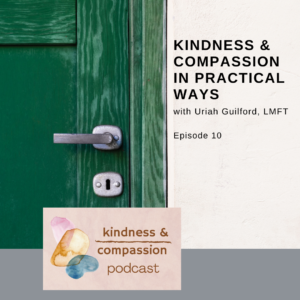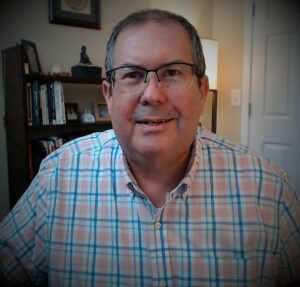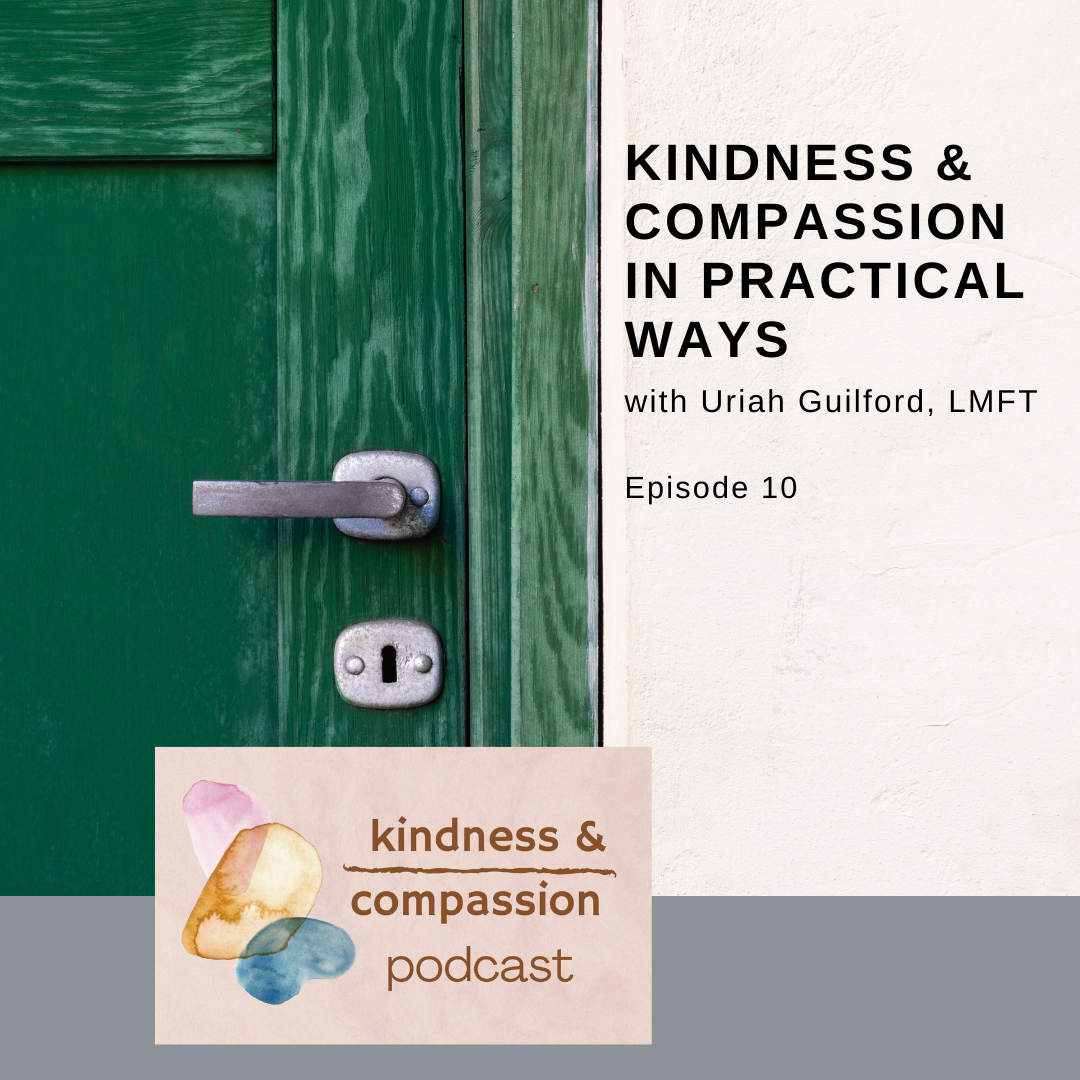 In this episode Gordon talks with Uriah Guilford, MFT, a marriage and family therapist from Northern California, about how kindness and compassion has impacted his life inside the therapy room and outside. They talk about ways in which we can all experience “compassion fatigue” and the need to shift to be more other focused on a bigger scale.
In this episode Gordon talks with Uriah Guilford, MFT, a marriage and family therapist from Northern California, about how kindness and compassion has impacted his life inside the therapy room and outside. They talk about ways in which we can all experience “compassion fatigue” and the need to shift to be more other focused on a bigger scale.
Uriah shares a personal story about a mission trip to Mexico with his oldest daughter and what realizations came through serving others. We also talk about how acknowledgement and validation is very profound and healing and how that takes place in therapy.
Meet Uriah Guilford
 Uriah is a licensed Marriage & Family Therapist with over 17 years of counseling experience.
Uriah is a licensed Marriage & Family Therapist with over 17 years of counseling experience.
He has a direct, but gentle approach, using insight and humor to motivate people to make positive changes.
He believes in focusing on people’s strengths and having specific goals in counseling to work towards, making as much progress as possible in the shortest time possible.
He is also married and has two wonderful daughters. You can read more of his personal story HERE.
Uriah helps young people ages 16-25 overcome anxiety, depression and other life challenges. He focuses on providing life skills and tools to increase emotional intelligence, handle anger & stress effectively and have satisfying relationships with friends and family members.
He works with families to improve communication and connection, as well as offering parent coaching, which can make a huge difference in creating a happy family.
In addition to these focuses, Uriah also works with men in their 30’s and 40’s, helping them to succeed at work and thrive at home.
Some of my most valuable experience came from the 6 years that I spent working in residential treatment centers for adolescents. I did everything with the teens, from cooking for them, going hiking and playing basketball to doing individual, family and group therapy with them. They taught me some amazing lessons about strength and courage in the face of adversity and how to be the kind of therapist that they really needed.
Uriah’s journey is to help teenagers and young adults to cope with and overcome the challenges they face. He is a practicing therapist for over 20 years and has recently shifted to be more in a role of supporting other therapists on his team.
Compassion Fatigue & Burnout
Over the last several years, a lot of us have experienced “compassion fatigue” on many different levels. In that we can experience vicarious trauma from the news in the world and seeing the suffering of others. Burnout on the other hand is when we feel overwhelmed with our work and our vocation feels stressful. Uriah and Gordon discuss ways in which they have overcome this. Ultimately, when we turn our focus outward and put our energy into helping others in practical ways, we can experience something different.
Experiencing Compassion Through Mission Work
Uriah shares a story about a mission trip that he took with his oldest daughter to Mexico. Doing something for someone on a different scale was eye opening and life changing for him. By doing the job of the framing of the front door for a single mom of four kids that had escaped a domestic violence situation brought a new sense of purpose and was very impactful in forming a new perspective of how he wanted to serve others going forward.
Gordon also shares being on a mission trip to Honduras and how that brought on an overwhelming sense of compassion. Both Uriah and Gordon agree that it is impossible to forget a feeling of obligation to do more and how these were transformational experiences.
Taking Concrete Action
Uriah’s Wish for the world is to see a lot more people taking concrete actions and choosing a life kindness and compassion. With the ongoing mental health crisis, his mission is to help other therapist avoid burnout. We need more therapist to be thriving to be able to help our communities. Find out more about Uriah and his work at – productivetherapist.com and guilfordfamilycounseling.com
Conclusion
We all have the potential for experiencing kindness and compassion in very small and practical ways. Self-care and care of others goes hand in hand. When we take care of ourselves and do those things that nurture and allows us to be vulnerable with others, we can experience compassion for ourselves and others. Its where kindness and compassion is found day in and day out. Take care of yourself and others.
Gordon (00:00):
Hello folks, and welcome again to the podcast. And I'm glad for you to get to know my good friend, Uriah, Gilford, uh, Uriah. And I have known each other about a year now, but he's another therapist and, uh, has been with me along the journey as I was kind of planning this podcast. And so, um, I knew he would be a good one to be here and tell some of his stories of kindness and compassion. So welcome your eye.
Uriah (00:26):
Thank you so much for having me Gordon. Always a pleasure.
Gordon (00:29):
Yeah. So a as you think about, um, practices of kindness and compassion, and we've talked about this a little bit along the way, um, what, what comes to for you just in your work as a therapist and how it's impacted people's lives?
Uriah (00:48):
Yeah. So I've been a practicing therapist for over 20 years, and I think I, I probably will start introducing myself as a retired therapist because I did stop providing direct services, but for just a little over 20 years, I was a licensed marriage and family therapist. Well, actually the 20 years covers pre-licensed time. Um, and certainly that if you had asked me two years ago, that would be my primary answer would be, this is my role. This is my position as a therapist. And I work with teenagers and families and provide compassion and kindness in, in that sort of context of helping families heal and grow and connect with each other. Um, and then I think that's changed somewhat since I'm no longer an acting therapist and I'm more in a role of supporting the therapist that are on my team. And, um, so yeah, it's kind of, it's kind of shifting mm-hmm
Uriah (02:00):
And so I was thrilled to have this conversation with you and, um, I think I like I'm developing as a, a person, um, to be more others focused, even though I've been a therapist for so long. Does that make sense?
Gordon (02:11):
Yeah, it does. It does. Um, and that, that makes sense because I think, um, you know, we can, we can sit in a therapy room with people and, you know, I think most of us that are in this field are kind of naturally empathetic, but there can become a little bit of burnout in just almost a little bit of compassion. Fatigue is maybe one thing that comes to mind. Um, and so I think, you know, being self aware of that is an important piece, definitely for a lot of us. So
Uriah (02:47):
I had several walls of compassion, fatigue over my career.
Gordon (02:50):
Oh yeah.
Uriah (02:50):
Working with, uh, primarily teenage boys who were not excited about being in the counseling room and hitting some walls with that. But that, that was my specialty and I, I loved it for sure.
Gordon (03:01):
Yeah. Yeah. Well, I know one of the things we talked about before we started recording is you had kinda some stories that, uh, where you've, where kindness and compassion you've had kind of that intersection with kindness and compassion in different settings, both in the therapy room and outside the therapy. Right.
Uriah (03:20):
Definitely. I had an experience last year where my oldest daughter and I went to, um, Mexico on a house building trip with our church and, um, down there in this particular part of Mexico, there's an orphanage. Um, that's doing really great work. There's a, a women's shelter. And then there's also this, um, you know, project of building houses for the women that are coming out of the women's shelter. And, um, this is not the kind of thing that I've ever done before. So it was new experience for myself mm-hmm
Uriah (04:04):
It was a great group. And I had part of the, part of what I was doing was, um, you know, I don't, I'm not a person with a ton of construction experience, so
Uriah (04:46):
And, um, we, we found out that she was in a very unsafe situation for a period of time and was able to escape that. And there was a good possibility that the house that they'd lived in, um, over the last couple years may not have had a locking door, probably didn't have a, a locking door to keep her and her family safe. Mm-hmm
Uriah (05:32):
Some that were not in the same situation, but in very difficult situations and trying to bring my empathy and compassion to them and help them in their, their journey. I always felt limited because there was only so much I could do, you know, in 50 minutes in a therapy session. And this was a totally different experience where I was able to do something very practical, very concrete that, um, to me, felt like making a difference. Mm-hmm
Gordon (06:18):
Yeah. Yeah. I think for anybody that's done anything like that, I, I, I don't know if we shared, um, with each other yet your I, but I used to do, do a lot of mission trips to Honduras and would do similar things. In fact, I got started going down there doing a, went on a habit that for humanity trip and building, you know, building houses and doing the, the hard labor and that kind of thing. And being in a, being in a place where people are in many ways, living in abject poverty, uh, by our standards anyway, mm-hmm
Gordon (07:21):
And it's, it's, it's one of those things where I think you, when, when you experience something like that, the there's an overwhelming sense of compassion. Mm-hmm
Uriah (08:05):
That's amazing. I love that. It, it seems like it's impossible for most people to go into a situation like that and not have an overwhelming feeling of compassion. Um, I think most people would, and a lot of us haven't seen true, like abject poverty
Gordon (09:14):
You know, in, in your work as a therapist, um, changed, kinda changed courses here just a little bit. What, what sort of impact have you seen where people have been, maybe been affected by kindness and it's changed them?
Uriah (09:33):
Yeah, that's a good question. I, I think about the families that I worked with over the years, um, I'm primarily a family therapist. That's how I kind of still identify, even though I'm retired,
Uriah (10:29):
Mm-hmm
Gordon (10:58):
Right. Right. Well, I think, uh, you know, my experience in similar similar situations, I think when people come in for therapy or counseling, um, when they, when they get to tell about themselves and it not be met with judgment or not be met with this or shame or any of that sort of thing, it has a way of just kind of transforming people, um, um, just in the, in the therapy room. Absolutely. Yeah, yeah. Yeah. I'm reminded of a story. I'll tell a little story here as well. Just a with a, with a client I was working with several years ago and it was a, it was a man and he, um, it long, long story short is that he had been abused, sexually abused as a, as a child, as a, as a pre, you know, young teen. And he had never really talked about that and never really shared that. And it had affected him so much that he just lived with his ongoing, terrible depression, and he had had some shock therapy and, you know, just some, you know, really
Uriah (12:37):
You know? Yeah. That's amazing. And that can happen in so many contexts, not just therapy, obviously anytime there's a human to human connection where some, one, one person expresses their vulnerability and what's, you know, shares something about what's really going on with them. And then the other person on the other side, doesn't respond with judgment or criticism. Like you're saying, um, that's a profound thing because I think we all think that everybody, if, if people really knew what I was going through or what I'm dealing with and they would, mm-hmm,
Gordon (13:15):
Yes. Yes.
Uriah (13:16):
Uhhuh is really meaningful. Yeah.
Gordon (13:18):
Yeah. Yeah. So it, to, to kind of pull things together for us, you right. As you think about, um, just this whole topic of kindness and compassion, um, what, what sort of changes would you hope for in the world?
Uriah (13:36):
Hmm. That's a good question. Do you ask that one to everyone?
Gordon (13:38):
I like that. No. No, just you,
Uriah (13:40):
You should
Gordon (14:57):
Yeah, yeah. I couldn't agree more. I think it's, um, you know, I think the more that we can teach people how to deal with their own own emotions and their own struggles, because I think, um, uh, as we know, just from the brain science what's happening in the brain is that that's that part of our brain called the Amy amygdala that takes over, which is really kind of fear based. And it's there for a good reason. It helps us survive, but when we can teach people how to kind of maybe better control that part themselves, they're much better equipped to show kindness and compassion and, and, and live with other people in a better way.
Uriah (15:41):
Absolutely. Yeah,
Gordon (15:43):
Yeah. Yeah. So you, right. Tell folks how they can get in touch with you if they wanna find out more about you.
Uriah (15:50):
Yeah. Probably the best place is productive therapist.com. That's kind of home for all of my, uh, current current passions. And then, uh, Gilford family counseling.com is, is where my, my group practice, uh, lives. Yeah.
Gordon (16:03):
Yes. So we'll have all this in the show notes and the show summary. And so thanks Uriah for being on this podcast and letting folks hear from
Uriah (16:13):
You. Thanks so much for having me Gordon.
Sign up to receive email updates
Enter your name and email address below and I'll send you periodic updates about the podcast.
About

L. Gordon Brewer Jr., LMFT |Podcast Host – Gordon has spent his career in helping professions as a licensed therapist, counselor, trainer, and clergy person. He has worked with 100’s of people in teaching them the how to better manage their emotions through self-care and the practices of kindness and compassion. Follow us on Instagram and Facebook . And be sure to subscribe to our newsletter.

